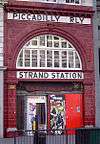Wood Street railway station
Wood Street is a railway station on the Chingford branch of the Lea Valley lines, located in Upper Walthamstow in the London Borough of Waltham Forest, east London. It is 7 miles 7 chains (11.4 km) down the line from London Liverpool Street and is situated between Walthamstow Central and Highams Park. It has been operated by London Overground since 2015.
| Wood Street | |
|---|---|
 Wood Street Location of Wood Street in Greater London | |
| Location | Walthamstow |
| Local authority | London Borough of Waltham Forest |
| Managed by | London Overground |
| Station code | WST |
| DfT category | D |
| Number of platforms | 2 |
| Fare zone | 4 |
| National Rail annual entry and exit | |
| 2014–15 | |
| 2015–16 | |
| 2016–17 | |
| 2017–18 | |
| 2018–19 | |
| Key dates | |
| 1873 | Opened |
| Other information | |
| External links | |
| WGS84 | 51.5864°N 0.0021°W |
It is also occasionally known as "Walthamstow Wood Street". The station is in Travelcard Zone 4.
History
The station was opened in 1873 by the Great Eastern Railway.[2]
On 13 February 1919 there was an accident at Wood Street when a passenger train ran into an empty stock train. Five people were injured – none seriously. The cause was a signal failure.[3]
In 1923 the Great Eastern Railway became part of the London and North Eastern Railway, which in turn was merged into British Railways Eastern Region following nationalisation in 1948.
When construction of the London Underground's Victoria line was given parliamentary approval in 1955, the plan was to build the line past Walthamstow Central station to Wood Street, where the line would surface to terminate next to the British Railways station, on land previously used as a coal depot. Before construction work started, a decision was made in 1961 to omit the section beyond Walthamstow Central.[4]
The line was electrified in 1960, and electric services commenced on 12 November. At first Class 305 EMUs were used, but initial technical problems led to their replacement by Class 302 and Class 304 EMUs.[5]
The station had a goods depot, which closed on 6 May 1968.[6]
In April 1994 Railtrack took over responsibility for the operation of the infrastructure. Train services have been operated since then by West Anglia Great Northern, National Express East Anglia, Abellio Greater Anglia and, as of 2015, by London Overground.
Engine shed
There was an engine shed located just north of Wood Street which was a sub-shed of Stratford TMD and was built in 1878.[7] The engine shed was a two road affair with space for 6 tank locomotives – there was also a short siding for coal wagons. An additional siding was added c1934.[8] By the 1950s the staff complement was 36 drivers, 36 Firemen and six Passed Cleaners although recruitment for what was a hard dirty job became more difficult during that decade.[9]
On 1 January 1922 the allocation consisted of three GER Class M15 2-4-2Ts (later LNER Class F4), two GER Class C72 (later LNER Class J68) and eleven GER Class S56 (later LNER class J69) 0-6-0T engines.[10]
In later years the main allocation of the shed was tank engines for working suburban services to and from London Liverpool Street and from the 1920s the allocation was exclusively the LNE N7 0-6-2T locomotives.
The shed was closed in 1960 when the line was electrified.
Services
Trains are operated by London Overground.
The typical off-peak weekday service pattern is:
- 4 trains per hour (tph) to London Liverpool Street;
- 4 tph to Chingford.
Connections
London Buses routes 230 and W16 serve the station.
References
- "Station usage estimates". Rail statistics. Office of Rail Regulation. Please note: Some methodology may vary year on year.
- Allen, Cecil J (1955). The Great Eastern Railway. Shepperton: Ian Allan. pp. 234–239.
- Voisey, Francis (January 2005). Great Eastern Railway Society Journal (121): 121.18–121.19. Missing or empty
|title=(help) - Horne, Mike (2005). The Victoria Line: An Illustrated History. Capital Transport. p. 26. ISBN 1-85414-292-5.
- Baker, John (July 1993). "Great Eastern section Electrification part 6". Great Eastern Journal (75): 29.
- Jackson, Alan A (1999). London's Local Railways ((2nd run) ed.). Harrow Weald: Capital Transport. p. 379. ISBN 1-85414-209-7.
- Hardy, Richard (April 2005). "Wood Street Loco – W J Barker Shed Chargeman". Great Eastern Railway Journal. 122: 122.2–122.6.
- Hawkins, Chris (1986). Great Eastern Railway Engine Sheds Part 1. Didcot: Wild Swan. pp. 62–68. ISBN 0-906867-40-1.
- Goodey, Peter (October 2004). Great Eastern Railway Society Journal. 104: 20. Missing or empty
|title=(help) - Hawkins, Chris; Reeves, George (1987). Great Eastern Railway Engine Shed Part 2. Didcot UK: Wild Swan. p. 379. ISBN 0-906867-48-7.
External links
| Wikimedia Commons has media related to Wood Street railway station. |
- Train times and station information for Wood Street railway station from National Rail
| Preceding station | Following station | |||
|---|---|---|---|---|
towards Liverpool Street | Chingford Line | towards Chingford |
||
| Abandoned Plans | ||||
| Preceding station | Following station | |||
towards Victoria | Victoria line | Terminus | ||
